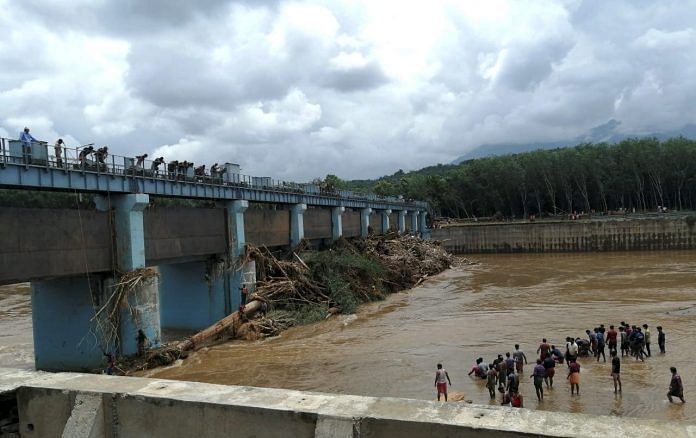New Delhi: The combined effects of carbon emissions and climate change can make the current flood situation a new normal for India, according to a new study conducted by scientists at IIT-Gandhinagar.
The study, published in the journal Weather and Climate Extremes, also stated that multi-day flood events are likely to increase at a faster rate in the future.
Incessant rains have wreaked havoc in as many as nine states this monsoon, killing several people and displacing lakhs. The National Disaster Response Force has so far rescued over 42,000 people in Kerala, Karnataka, Maharashtra, Andhra Pradesh, Madhya Pradesh and Gujarat.
According to the study by IIT-Gandhinagar scientists Haider Ali, Parth Modi and Vimal Mishra, floods have increased over the past decades and the situation is likely to worsen further owing to warming of the climatic system across the world.
The study
For the study, the researchers used climate and precipitation data from the India Meteorological Department for the period between 1901 and 2015.
The team then simulated rainfall and flood predictions under different climatic conditions. They found that although the rise in extreme precipitation events is not statistically significant, the frequency of multi-day flood events is increasing at a faster rate than previously thought.
The study stated that changes in the frequency of floods and their associated risks under the impact of warming of climate remain largely unrecognised in Indian sub-continent.
According to Mishra, associate professor at IIT-Gandhinagar, rising temperatures increase the holding capacity of the atmosphere, leading to a sharp increase in rainfall.
“So, because of climate change, extreme rainfall events increase, which in turn cause floods that are driven by heavy rainfall events,” he told ThePrint.

Also read: Rescue efforts conclude in flood-hit western Maharashtra, focus now on relief & damage assessment
Effects of flood
The research also highlighted how climate change can have unprecedented effects on human lives.
The study stated that the risk of multi-day floods can be reduced by half in a low emission scenario — where global warming is limited to below one degree Celsius.
However, Mishra also said it is highly unlikely that the world will be able to achieve the target set by Paris Agreement of limiting the increase in global average temperature to below 1.5 degrees Celsius.
Mishra said the short-term measure is to improve the infrastructure in a way to minimise flood losses. “Apart from human losses, these floods are also doing a lot of damage to agriculture and infrastructure. That has an economic cost associated with floods. That is basically the adaptation cost that needs to be invested. You have to invest more money to protect your crops and buildings,” Mishra said.
But ultimately for the long term, there is a need to reduce emissions to mitigate global warming, he added.
Also read: Mumbai record rainfall since 2005 exposes same old issues as city refuses to learn lessons




India should consider speeding up the transition away from coal.